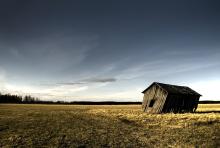God
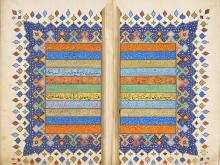
The exhibit is not intended as commentary on today’s politics, its organizers said. Work started on the project six years ago, before sharp rises in Islamophobic rhetoric and violence in the U.S. and Europe, and before Muslim immigration and culture became a flashpoint in American and European politics.
But the Smithsonian is not sorry for the timing, and hopes the exhibit can help quell fears of Islam and its followers.
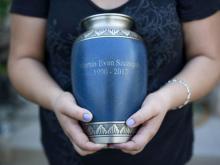
Catholics can be cremated under certain conditions, the Vatican has said, but loved ones should not scatter the ashes at sea, or on land, or into the wind, nor should they keep them in mementos or jewelry.
Instead, say new guidelines released on Oct. 25, the remains should be stored “in a sacred place” that “prevents the faithful departed from being forgotten” and “prevents any unfitting or superstitious practices.”

The study comes in the same year that Larycia Hawkins — Wheaton College’s first black, female professor to receive tenure — parted ways with the evangelical flagship school after she posted on Facebook that both Christians and Muslims worship the “same God.” The controversy stirred fresh debate among evangelicals about whether all religions worship the same God, and whether God accepts the worship of all religions.

Harper’s account of the Gospel in her new book is shalom-based. Drawing deeply from a theme that runs through the Bible but is especially strong in the Hebrew prophets, Harper tells a story of a God who acts in Jesus Christ to bring shalom, or holistic peace and justice, in every part of creation.

[Editor's note: This article is excerpted from Stars Beneath Us: Finding God in the Evolving Cosmos by Paul Wallace copyright (c) 2016 Fortress Press. Reproduced by permission of Augsburg Fortress. No further reproduction allowed without the written permission of Augsburg Fortress.]
WHAT ARE WE to do with an obsolete God?
We have options. We could, as I did for a while, put God aside. ... We can try, but I’m pretty sure that God is the question that won’t go away. Silence it here and it will pop up over there. It may show up as worship of science, or the economy, or a political cause, or ego, or an addiction, or sex, or a fellow human being—or whatever, but show up it will. Some humanists and atheists have expressed contempt for religious believers’ worship of God. They ask, Why worship anything at all? One online interlocutor once asked me, “How can you put the word ‘worship’ on your signs? Isn’t that demeaning?” I replied, “No, it is truth in advertising. We all worship something.” I am convinced that not all worship is true worship, but I am equally convinced that religious believers at least acknowledge that worship is simply what all people, religious and otherwise, do. There’s nothing for it but to accept it and make the best of it.
We could also try to build a new God out of the raw materials of science itself. It’s hard to disagree with Ralph Waldo Emerson when he writes, “Nothing is great but the inexhaustible wealth of nature. She shows us only some surfaces, but she is a million fathoms deep.” Isn’t the cosmos astounding, and isn’t the wonder it stirs in us something akin to a religious feeling? Yes and yes. Without such feelings there would be no religion at all. But are such feelings enough? Is the mind-blowing order and complexity and diversity and beauty of the cosmos sufficient to slake our religious thirst? For some it may be and I can nearly, but not quite, imagine how it could be enough for me.
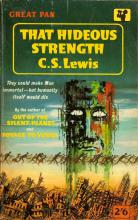
Lewis calls us to caution, to humility in the face of our quest for power. Just because we can does not mean we should. Even if you’re an optimistic transhumanist professor in England. That Hideous Strength is a devastating picture of that danger, more than fifty years ahead of its time.

As a lifelong reader of fantasy and science fiction, my favorite stories were those set not only in a different time but a different world altogether. It’s exciting to enter into a wholly new landscape, and, as avid readers of both genres will say, there’s both power and joy in watching people and creatures do battle with the same forces we recognize in our daily lives (including, possibly, the power to overcome real-world social divisions — despite decades of the science v. religion binary, there’s ample evidence that both sides love hobbits).

No matter how charismatic, merciful (usually), or full of truly ancient wisdom the Doctor may be, he ultimately knows himself as less than God. It’s not likely that the Doctor believes in God, and he has particularly bad associations with Christmas, and he recognizes that he isn’t the Lord — he’s just a Time Lord. He forces Amy to face the fact that he cannot save her — that he is just a madman with a box, nothing more.

But perhaps the reason why the darkness cannot understand or overcome the Light is because it will not and cannot imagine reducing itself or condescend to be like its enemy in order to overcome it. Scripture describes an adversary who wanted to be like God, but doesn’t seem to understand that God’s very nature is “gentle and humble and heart.” The nature of darkness is not a generous one. It doesn’t offer light or heat or allow other things to grow. It isolates.
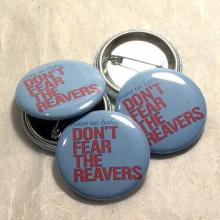
Joss Whedon may not profess spiritual belief, but throughout his career, from Buffy the Vampire Slayer to Avengers and Agents of S.H.I.E.L.D., his work has fascinated believers. This may be, in part, because Whedon is a humanist, and his belief in respecting the dignity of all people is a common theme in his work. Whedon’s shows consistently emphasize compassion for people of all backgrounds and worldviews, even (especially) when his characters’ beliefs don’t match up.

Han shooting first isn’t just a better story — it’s also a truer one. The Bible is full of stories of people being given honors and responsibilities they don’t think they deserve (and to our eyes, definitely don’t). It’s in God’s character to want more for people than they want for themselves. This shows up again and again in the ways God interacts with our world. And we are made in God’s image — when we see this kind of story told well, we respond to it. The original version of Star Wars tells this kind of story about Han Solo.

When my wife, Karen, and I lived in Jerusalem, we awakened each morning to see the rising sun shining on the Mount of Pentecost. It is the traditional site of the coming of the Holy Spirit (Acts 2), the Upper Room, and King David’s tomb.
The power of that image remains in our consciousness. But even more compelling was the view from our hillside terrace where we had breakfast and entertained our friends. Below, between our home and the holy “mountain” 100 yards across the Hinnom Valley, was the still garbage-strewn site of the Moloch cult’s altar where babies were sacrificed to the presumed angry Israeli god — a place condemned as cursed, with no buildings for 2,500 years.
The contrast was always startling. Land, hills, trees, military power, and false religion have become the idolatrous substitute for God himself, as church historian Martin Marty has noted. And the fact is that “children” such as Rachel Corrie, Israeli soldiers, Palestinian stone throwers, and totally innocent little infants are dying daily, as contemporary sacrifices to an idolatrous god.

THE DOG DAYS OF SUMMER can make for a preaching desert without an oasis in sight. This can be a fine time to take a vacation from the lectionary. Huge swaths of scripture go untreated otherwise—the entire Samson cycle, most of the cursing psalms, most of the gospel of John. One friend spends a portion of every year preaching through blockbuster movies and how they intersect with the scriptures. Another devoted a preaching series to favorite children’s books.
Here in August the lectionary itself seems to take a vacation, visiting the discourse about bread in John’s gospel, inviting us to see every bit of bread, every bite of food, as filled with Jesus. Texts about water invite us to see all water as a sign of the God who creates us in the water of a womb and gives water for our salvation in baptism (an especially apt teaching point for those still sandy-toed from the beach).
A friend’s pulpit has on it “tree of life,” written in Hebrew—inviting all to see trees as reminders of the tree from which our first parents ate fruit forbidden to them, the tree on which Jesus was crucified, and the tree in the City of God whose leaves are for the healing of the nations.
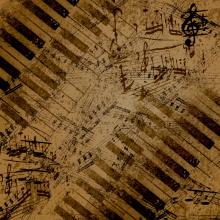
What I am learning is that the new normal is not that I no longer experience God, but that God is meeting me in new ways. The new normal is that I don’t need to hear people play guitar telling me to feel God’s love from a stage. I find God’s love in much less conspicuous places, from the stranger behind me who felt too awkward to shake my hand, to the silly doodles my kids were making on the church bulletin. The new normal is that I no longer find authority in celebrity pastors preaching at me, but I do find it listening to unheard voices of small bloggers and older people who aren’t social media savvy.
The new normal is that I hear the "Roman Road" gospel preached and find it dull and superficial, and yet feel overwhelming conviction in the cross lived out by people who forgive their enemies.
The new normal is that although God has not changed, I have changed. And like a parent who stops cooing in baby talk, God is starting to speak in new, fresh ways to me.

As a ten-year-old suburbanite, I saw a black dog stumble through the cul-de-sac without a collar and named him “The Devil.”
I remember a couple years later deciding I was wrong — that the devil was bearded, gendered, nocturnal, and afraid of my prayers.
I think about the devil differently now. I think less about bearded imps and more about the incarnations of evil I see around me: racist shootings, the disrespected bodies of women, dusty nukes.
The devil has evolved and morphed throughout Judeo-Christian history as well, going from absent, to messenger, to adversary, to the evil commander in an eschatological battle, to metaphor, to the Broadway sock puppet described in Stephanie Sandberg’s “Devils We Know” (Sojourners, July 2015). In many ways, the devil’s role in scripture is as changing and fascinating as the devil’s role in pop culture.
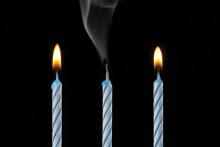
What’s it like to share your stories of loss to a room of hundreds? Wm. Paul Young (author of The Shack), Reba Riley (Post-Traumatic Church Syndrome), and Christian Piatt (PostChristian) are about to find out — and help others do the same. The three bestselling authors are launching a two-stop tour — "Where's God When..." — in Seattle and Portland on May 16 & 17, to help others hear, and share, their own stories of grief, heartbreak, and healing.
Sojourners sat down with the authors last week to talk loss, return to faith, and what it’s like to coordinate a tour focused on hard questions about God. Interview edited for length and clarity.
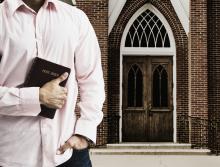
Being “right” is exhausting.
You know what I mean. A controversy blows up over social media and the faith must be defended. A conversation about church practices becomes a nitpicky theological debate. A news story catches our eye and we are filled with outrage and take to our laptops to be the first to comment.
I feel as though I live in a world in which I’m constantly tempted — and encouraged — to major in details and minutiae and miss the very real and beautiful and incomprehensible presence of God.
Which is why being “right” is exhausting.
I thought of this the other day while visiting a different church from the one in which I am a member. My first — and wrong — reaction was to tense up. It seemed that everything about church that I had tried to escape was on display. I’ve learned to pay attention to those reactions. I have found that whenever something bothers me and makes me speak in absolutes, it’s because there’s a part of my heart I want to hoard for myself instead of allowing God’s light to shine on it. I hate to admit it, but so much of my identity as a Christian is defined by what I’m not.

A friend mentioned that he likes my blogs dealing with love and compassion and other themes without getting into religion specifically. He said that the mention of God can make things uncomfortable.
My reaction: I know exactly where he’s coming from.
The word “God” has become such a loaded term. We’ve made it that way; God hasn’t done it. And the truth is, I’ve found myself shying away from using the word at times because I’m aware it’s an immediate turnoff to some people. They have the same sort of visceral reaction that we get when we see one of those political attack ads come onto our TV set.
We want to reach for the remote and change the channel.
One of the reasons I started writing blogs was to try to strip away some of the nonsense we’ve attached to the name. And there is so much nonsense. You know what I mean:
That God loves me more than you. God approves of me and those who are like me, but not you and those who are like you. God likes my religion and my way of life, but not yours. God is on my side in any disagreement. God approves of hatred and judgment and killing. God promotes crusades and inquisitions and holy wars.
So much …

As Western nations evacuate their citizens from West Africa’s growing Ebola outbreak, some Christian leaders have begun to speak of the virus as a curse from God.
On Friday, the World Health Organization declared the Ebola crisis ravaging the region an international health emergency. On the same day, Nigeria became the latest country in West Africa to declare the virus crisis a national emergency, the day after Spain evacuated a priest and a nun from Liberia to Madrid.
On Saturday, a Congolese nun died from Ebola in Monrovia, the capital of Liberia, the AP reported.
The outbreak started in December in Guinea, but was not discovered until March. It has since killed more than 1,000 people in Liberia, Guinea, and Sierra Leone.
“People are having different misconceptions that this is [a curse] from God,” said Bishop Sumoward Harris, now retired from the Lutheran Church in Liberia. “This is depending on how they are interpreting the Bible. But I don’t think God is angry and is issuing a punishment.”
In Liberia, more than 100 Christian leaders meeting in early August declared that God was angry and Ebola a plague.
